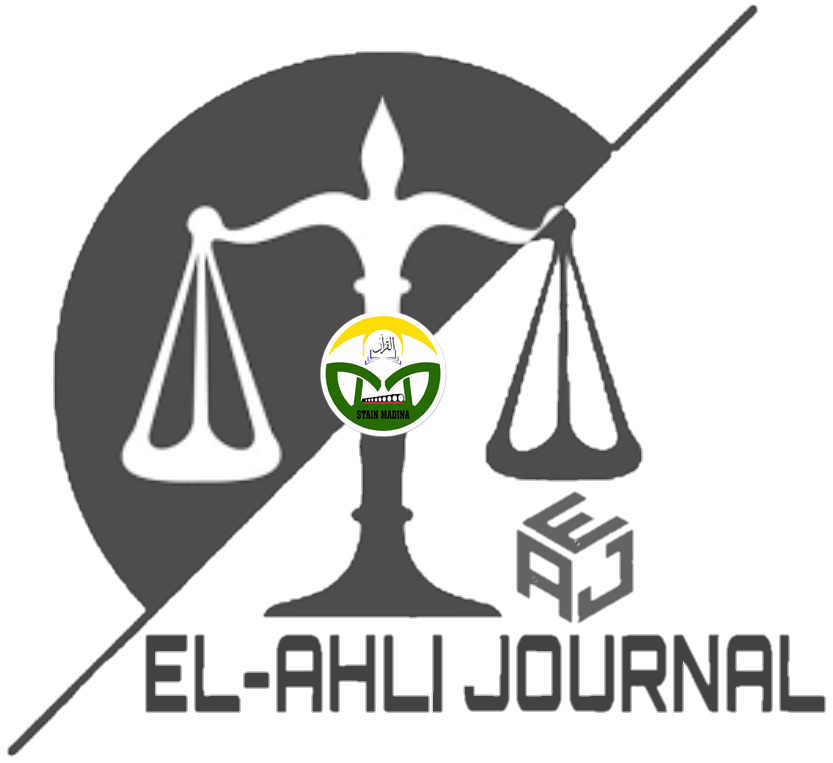IMPLEMENTASI HUKUM WARIS DALAM ISLAM: STUDI KOMPARATIF TENTANG PRAKTEK WARIS DI NEGARA-NEGARA MUSLIM
DOI:
https://doi.org/10.56874/el-ahli.v4i2.1267Kata Kunci:
Implementasi Hukum Waris Islam, Praktek Waris di Negara-Negara Muslim, Studi Komparatif Waris Muslim.Abstrak
This study aims to examine the implementation of inheritance law in Islam through a comparative study of inheritance practices in several Muslim countries. This study uses a comparative descriptive method by collecting data through literature study and analysis of relevant literature. Several Muslim countries that are the object of study include Saudi Arabia, Egypt, Indonesia, and Malaysia. These countries were chosen because they represent different Islamic legal traditions and have differences in their inheritance practices. The results of this study indicate that although there are similarities in the principles of inheritance law in Islam, their implementation may differ in each country. Saudi Arabia, as a country that strictly implements Sharia, follows the inheritance system specified in the Al-Qur'an and the hadiths of the Prophet Muhammad. Egypt, on the other hand, has an inheritance system which is influenced by their national laws which sometimes conflict with Islamic principles. Indonesia and Malaysia, which employ mixed legal systems, have inheritance laws that incorporate Islamic principles but also take into account cultural factors and local customs. It is hoped that the results of this research can become the basis for improving and developing inheritance law systems in Muslim countries, so that they can achieve justice in accordance with Islamic principles.
Referensi
Abdul Rahman I. Doi. (1984). Shariah: The Islamic Law.
Abdulaziz Abdulhussein Sachedina. (2001). Islamic Messianism: The Idea of Mahdi in Twelver Shiism.
Abdullah S. Al-Sammani. (2014). Islamic Inheritance Law in Saudi Arabia: The System and Challenges. Arab Law Quarterly, 28(2), 153-170.
Abou El Fadl, Khaled. "Islam and the Challenge of Democracy: A "Clash of Civilizations"?" Journal of Church and State 41, no. 4 (1999): 747-765.
Ahmadnia, P. (2011). Inheritance law in Iran: An overview. Iranian Review for Law of the Sea and Maritime Policy, 10(18), 107-124.
Al-Fauzan, S. (2018). Inheritance in Saudi Arabia: An Overview. Arab Law Quarterly, 32(2), 119-145.
Al-Mohanna, M. (2017). The Right of Women to Inherit in Saudi Arabia: An Analysis of the Current Laws and Practices. Arab Law Quarterly, 31(2), 123-153.
Al-Obaidan, F. (2019). Succession Planning in Saudi Arabia: A Comparative Study of the Saudi Law of Succession and the English Law of Wills and Intestacy. Arab Law Quarterly, 33(1), 68-89.
Al-Qaraḍāwī, Y. (1999). Al-Ḥalāl wal-Ḥarām fī al-Islām. Maktabah Wahbah.
Al-Quran Surah An-Nisa Ayat 11-12.
Al-Shahrani, A. A. (2015). Inheritance and Women's Rights in Saudi Arabia. Journal of International Women's Studies, 16(3), 203-216.
Al-Shahrani, Abdullah Ali. (2007). Islamic Law of Inheritance: A Comparative Study of Recent Reforms in Saudi Arabia, Jordan, and Syria. Arab Law Quarterly, 21(3), 283-310.
Al-Shahrani, Abdullah Ali. (2007). Islamic Law of Inheritance: A Comparative Study of Recent Reforms in Saudi Arabia, Jordan, and Syria. Arab Law Quarterly, 21(3), 283-310.
Amin, H. L. (2011). Principles of Islamic jurisprudence. Islamic Texts Society.
An-Na'im, A. (2008). Islam and Human Rights: Advocacy for Social Change in Local Contexts. University of Pennsylvania Press.
An-Naim, Abdullahi Ahmed. Toward an Islamic Reformation: Civil Liberties, Human Rights, and International Law. Syracuse University Press, 1990.
Ansari, M. (2014). The principles of inheritance under Shia Islamic law: A comparative study with Islamic law of Sunni schools. International Journal of Business, Humanities and Technology, 4(4), 92-102.
Azami, Dawoud El Alami. (2012). Inheritance Rights under Islamic Law in Iran: A Critical Analysis. Arab Law Quarterly, 26(2), 119-136.
Aziz, M. A. (2017). Waris Menurut Hukum Islam dan Hukum Positif di Indonesia. Jurnal Hukum dan Peradilan, 6(1), 137-156.
Az-Zuhaili, W. (2001). Al-Fiqh Al-Islami wa Adillatuhu. Dar El-Fikr.
Badawi, Jamal A. "Inheritance in Islam." The American Journal of Islamic Social Sciences 3, no. 1 (1986): 81-95.
Coulson, N. J. (1996). A history of Islamic law. Edinburgh University Press.
Dety Mulyanti, Rheza Fasya, Diana Farid, Muhammad Husni Abdulah Pakarti, and Hendriana Hendriana. 2023. “Pengaruh Program Senyum Juara Terhadap Peningkatan Penghimpunan Dana ZIS Pada Rumah Zakat”. Transformasi: Journal of Economics and Business Management 2 (2):93-107. https://doi.org/10.56444/transformasi.v2i2.723.
El Alami, D. (2015). Succession in Muslim Family Law. Routledge.
El-Awa, M. S. (1993). Punitive damage in Islamic law of tort: An examination of the liability for punitive damage under the Sunni doctrine. Arab Law Quarterly, 8(4), 350-372.
El-Awa, Salwa M.S. "The Theory of Property in Islamic Law." Arab Law Quarterly 2, no. 3 (1987): 262-281.
El-Awa, Salwa M.S. Islamic Law: Its Relation to Other Legal Systems. The American Society of Comparative Law, 2006.
Emami, S. M., & Farmani, M. J. (2014). Islamic inheritance system: An analytical review of Sunni and Shiite jurisprudences. Journal of Law and Ethics, 1(2), 17-30.
Farid, D., Abdulah Pakarti, M., Hendriana, H., & Fathiah, I. (2022). Interfaith Marriage: Subjectivity of the Judge in Determination of No. 454/pdt.p/2018 Surakarta District Court. Al-Istinbath: Jurnal Hukum Islam, 7(2 November), 347-362. doi:http://dx.doi.org/10.29240/jhi.v7i2.4574.
Farid, D., Hendriana Hendriana, Muhammad Husni Abdulah Pakarti. "Analisis Metode Penafsiran Hakim Tentang Perkawinan Beda Agama (Studi Kasus Penetapan No. 959/Pdt.P/2020/Pn.Bdg Dan Penetapan No.71/Pdt.P/2017/Pn Bla)." Usrah: Jurnal Hukum Keluarga Islam 5, No. 2 (2022): 118-132. Doi: https://Doi.Org/10.46773/Usrah.V3i2.549.
Farid, D., Muhammad Husni Abdulah Pakarti, Fathiah, I & Hendriana, H. "HARMONISASI HUKUM MENENTUKAN MASA IDDAH BAGI WANITA CERAI DI LUAR PENGADILAN MENURUT KOMPILASI HUKUM ISLAM DAN HUKUM FIQH." Usrah: Jurnal Hukum Keluarga Islam 4, No. 1 (2023): 118-132. Doi: https://doi.org/10.46773/usrah.v4i1.658.
Farid, D., Muhammad Husni Abdulah Pakarti, Usep Saepullah, Hendriana. “Peran Kanal Online Dalam Edukasi Pranikah.” Fastabiq: Jurnal Studi Islam 3, no. 1 (2022): 30–39. doi: https://doi.org/10.47281/fas.v3i2.108.
Farid, D., Muhammad Husni Abdulah Pakarti, Mohamad Hilal Nu’man, Hendriana Hendriana, Iffah Fathiah. “Talak Perspektif Kesetaraan Gender: Perintah Tuhan Menerapkan Egaliter Di Dalam Rumah Tangga.” Tahkim, Jurnal Peradaban Dan Hukum Islam 6, no. 1 (2023): 1-18. https://doi.org/10.29313/tahkim.v6i1.10849.
Farid, D., Muhammad Husni Abdulah Pakarti, Iffah Fathiah, Hendriana Hendriana, and Mohamad Hilal Nu’man. 2023. “Marriage and Divorce Practices in the Society of Bandung: Contestation of Islamic and State Law”. Al-Qadha : Jurnal Hukum Islam Dan Perundang-Undangan 10 (1), 65-78. https://doi.org/10.32505/qadha.v10i1.5673.
Hadjon, P. M. (2019). Hukum Waris dalam Perspektif Pluralisme Hukum Adat di Indonesia. Jurnal Dinamika Hukum, 19(2), 157-174.
Hasan, M. (2017). Muslim Family Law in Western Courts. Routledge.
Hashim, R. (2017). Women's inheritance in Islam: A critical analysis of the classical Islamic law of inheritance in light of the contemporary demands for reform. Journal of Islamic State Practices in International Law, 13(2), 22-53.
Hosen, Nadirsyah. "Islamic Law and Legal System: Studies of Malaysia and Indonesia." Australian Journal of Asian Law 10, no. 2 (2009): 1-22.
Jasser Auda. (2008). Maqasid al-Shariah as Philosophy of Islamic Law: A Systems Approach.
Jonathan Brown. (2014). Misquoting Muhammad: The Challenge and Choices of Interpreting the Prophet's Legacy.
Kamali, M. H. (1999). Principles of Islamic jurisprudence. Islamic Texts Society.
Kamali, Mohammad Hashim. Principles of Islamic Jurisprudence. The Islamic Texts Society, 2003.
Khadduri, M. (1978). The Islamic law of nations: Shaybani's Siyar. The John Hopkins University Press.
Mallat, C. (2015). Introduction to Middle Eastern law. Oxford University Press.
Martini, S. (2021). Implementasi Hukum Waris Sipil dalam Perlindungan Hak-Hak Perempuan di Indonesia. Jurnal Kajian Hukum Dan Hukum Islam, 8(1), 35-50.
Masud, Muhammad Khalid, Brinkley Messick, and David S. Powers, eds. Islamic Legal Interpretation: Muftis and Their Fatwas. Harvard University Press, 1996.
Mernissi, F. (1991). Women and Islam: An Historical and Theological Enquiry. Blackwell.
Mir-Hosseini, Z., & al-Shaykh, S. (Eds.). (2013). Men in Charge?: Rethinking Authority in Muslim Legal Tradition. Oneworld Publications.
Muhammad Taqi Usmani. (2001). The Islamic Laws of Inheritance.
Muhammad Husni Abdulah Pakarti, Iffah Fathiah. “Itsbat Nikah Sebuah Upaya Mendapatkan Mengakuan Negara.” Tahkim, Jurnal Peradaban Dan Hukum Islam 5, no. 2 (2022): 21–42. https://doi.org/10.29313/tahkim.v5i2.10064.
Nafisi, M. R. (2017). Iranian law of succession. In M. R. Nafisi (Ed.), Introduction to Iranian Law: Fourth Edition (pp. 269-282). Brill.
Nuryamin, Nuryamin, Diana Farid, Muhammad Husni Abdulah Pakarti, Hendriana Hendriana, and Mohamad Hilal Nu’man. 2023. “Putusan Hakim Dalam Menuntaskan Sengketa Perkawinan Poligami Di Indonesia”. JUSTISI 9 (2):133-44. https://doi.org/10.33506/jurnaljustisi.v9i2.2303.
Pour-Mohammadi, M., & Alam, K. (2018). Estate planning for Muslims in Iran: Challenges and solutions. Journal of Islamic Accounting and Business Research, 9(1), 57-77.
Pakarti, Muhammad. 2022. “Putusan Hakim Pengadilan Negeri Surakarta Terhadap Perkawinan Beda Agama Yang Legal Secara Hukum Negara”. Mutawasith: Jurnal Hukum Islam 5 (2), 99-110. https://doi.org/10.47971/mjhi.v5i2.445.
Rahman, Fazlur. Islam and Modernity: Transformation of an Intellectual Tradition. University of Chicago Press, 1984.
Ridwan, Ridha Romdiyani, Arfi Hilmiati, Muhammad Husni Abdulah Pakarti. Surat Ar-Ruum Ayat 21 Petunjuk Tuhan Untuk Menjalankan Nilai-Nilai Pendidikan Dalam Keluarga." Usrah: Jurnal Hukum Keluarga Islam 5, No. 2 (2022): 143-160. Doi: https://Doi.Org/10.46773/Usrah.V3i2.558.
Schacht, J. (1964). An introduction to Islamic law. Clarendon Press.
Sudewo, A., & Zainal, S. (2018). Hukum Waris Sipil dan Adat di Indonesia: Suatu Tinjauan. Jurnal Hukum Prasada, 5(2), 84-100.
Tjandra, F. (2020). Hukum Waris Adat dan Implementasinya di Indonesia. Jurnal Hukum dan Pembangunan, 50(3), 413-426.
Tucker, J. E. (2016). Women, Family, and Gender in Islamic Law. Cambridge University Press.
Vogel, F. E., & Samuel, S. W. (2006). Islamic law and finance: Religion, risk, and return. Kluwer Law International.
Wasdikin, W, Mohamad Muidul Fitri Atoilah, Yogi Iskandar, Muhammad Husni Abdulah Pakarti. Asas Hukum Kewarisan Islam Sebagai Parameter Dalam Menyelesaikan Masalah Waris."Al-Ahwal Al-Syakhsiyyah: Jurnal Hukum Keluarga dan Peradilan Islam 4, No. 1 (2023): 15-28. Doi: https://doi.org/10.15575/as.v4i1.21052.
Welchman, L. (2000). Beyond the Code: Muslim Family Law and the Shari'a Judiciary in the Palestinian West Bank. Arab Law Quarterly, 15(1), 21-44.
Welchman, L. (2007). Beyond the Code: Muslim Family Law and the Shari'a Judiciary in the Palestinian West Bank. BRILL.
Yahya, Harun M. (2018). Islamic Law and Adat Customary Law in Indonesian Inheritance. Journal of Muslim Minority Affairs, 38(2), 193-207.
Unduhan
Diterbitkan
Cara Mengutip
Terbitan
Bagian
Lisensi
All articles published in EL-AHLI: Jurnal Hukum Keluarga Islam are licensed under a Creative Commons Attribution-ShareAlike 4.0 International License (CC BY-SA 4.0).
Under this license, authors and readers are free to:
-
Share — copy and redistribute the material in any medium or format.
-
Adapt — remix, transform, and build upon the material for any purpose, even commercially.
Under the following terms:
-
Attribution — You must give appropriate credit, provide a link to the license, and indicate if changes were made. You may do so in any reasonable manner but not in any way that suggests the licensor endorses you or your use.
-
ShareAlike — If you remix, transform, or build upon the material, you must distribute your contributions under the same license as the original.
Copyright and Licensing Policy:
-
The author retains copyright and grants the journal the right of first publication with the work simultaneously licensed under the Creative Commons Attribution-ShareAlike 4.0 International License, which allows others to share the work with acknowledgment of the work’s authorship and initial publication in this journal.
-
Authors are allowed to enter into separate, additional contractual arrangements for the non-exclusive distribution of the journal's published version of the work (e.g., post it to an institutional repository or publish it in a book), with an acknowledgment of its initial publication in this journal.
Link to License:
https://creativecommons.org/licenses/by-sa/4.0/





